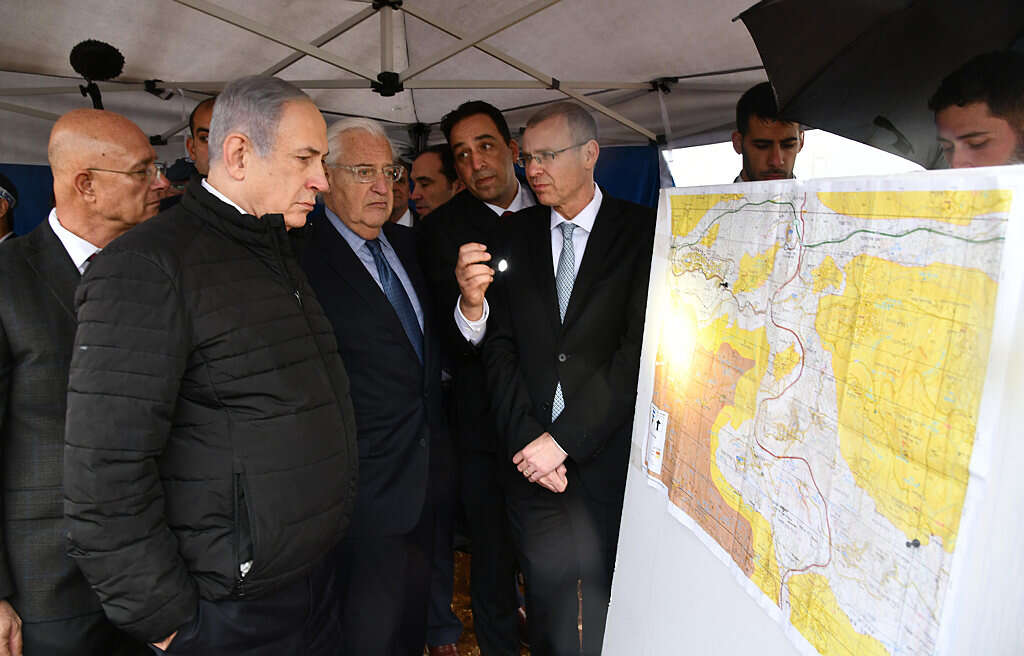by Ariel Kahana
One American official tells Israel Hayom: "If the settlers don't want what the administration currently has to offer, they shouldn't come to us in the future. The expectation was that they see the bigger picture."
Frustration is mounting among US administration officials over the g over the position expressed by some setter leaders in Israel, who oppose President Donald Trump's "deal of the century."
The deal stipulated that Washington will endorse an Israeli decision to apply sovereignty to large parts of Judea and Samaria and the Jordan Valley, a move Prime Minister Benjamin Netanyahu said he plans to pursue as early as July 1, in accordance with the Trump administration's vision for peace.
To apply sovereignty, Israel must decide to enact Israeli law in the areas agreed upon with the United States. Applying Israeli law could be done through a government decision and/or parliamentary legislation. Within the framework of the coalition agreement, Netanyahu has laid the necessary foundation to implement the sovereignty initiative, including the stipulation that it can be actualized via a government decision or Knesset legislation.
The preferred course of action still has not been decided, and it appears this will depend on the ability to secure a majority in either the Knesset or government in favor of the move.
In recent months, a joint American-Israeli committee has been meticulously delineating the exact areas designated for sovereignty. The mapping process has been ongoing, even as the government was being formed and during the coronavirus pandemic. On the Israeli side, the mapping process is being headed by Ronen Peretz, the director-general of the Prime Minister's Office.
US Ambassador to Israel David Friedman previously told Israel Hayom that the US's role in the process has mostly been passive and that the mandate for drawing up the lines largely belonged to Israel.

Officials in the Trump administration intend to fully support Israel when the move is finally made, but in conversations with numerous American officials it appears they have no intention of pushing Israel to apply sovereignty.
Trump's peace team, headed by senior advisers Jared Kushner and Avi Berkowitz, is mostly preoccupied with managing the coronavirus pandemic and the upcoming presidential election scheduled for Nov. 3, and as long as the health crisis persists they likely won't give the Israeli-Palestinian issue a great deal of attention.
On the American side, meanwhile, frustration is mounting over the position of the Yesha Council – an umbrella organization of municipal councils of Jewish communities in Judea and Samaria – which in recent days has launched a campaign to persuade right-wing ministers and MKs to oppose the Trump plan.
One American official familiar with the details told Israel Hayom, "If the settlers don't want what the administration currently has to offer, they shouldn't come to us in the future. The expectation was that they see the bigger picture, remember where they were standing in December 2016 (when the United Nations Security Council passed Resolution 2334 that harmed Israel and was spearheaded by the Obama administration), and that they consider where they could be standing four years from now if the Palestinians continue to reject negotiations with Israel."
Ratifying a historic decision of this magnitude is fraught with internal and external challenges. First and foremost, as stated, a majority is needed in the Knesset and/or government, and because many details pertaining to the endeavor are still unknown, some ministers have yet to formulate a position.
Most Likud ministers support the move – although it's possible that more hard-line ministers, such as Ze'ev Elkin or Tzipi Hotovely, will either oppose or abstain. Even Prime Minister-designate Benny Gantz of the Blue and White party, views the Trump plan favorably. Gantz, however, still hasn't decided whether to allow the members of his faction to vote freely on the issue.
Among the ministers in Gantz's bloc, Yoaz Hendel is certain to support the sovereignty measure. Other ministers from Gantz's faction who could support the measure are Yehiel Tropper, Pnina Tamano-Shata and Omer Yankelevich.
Diplomatic and security risks will also influence the ministers' decisions. There is significant opposition to the historic move within the international community. Russia, the European Union and the majority of its member states, along with other countries, have warned Israel against annexing parts of Judea and Samaria. The most severe threat came from Jordan's King Abdullah, who warned of a "massive conflict with Israel."
On Sunday, Turkish President Recep Tayyip Erdogan warned: "We will not allow Palestinian lands to be offered to anyone." As they approach their decision, Netanyahu and the ministers will also take these aspects into account.
As noted, only very few senior Israeli officials are familiar with the details of the initiative. The prime minister has yet to present the final map. A proposed text of the decision still hasn't been presented for cabinet or government approval, while the IDF's Military Intelligence Directorate, Foreign Ministry and the Mossad intelligence agency still have not presented their assessments.
Ariel Kahana
Source: https://www.israelhayom.com/2020/05/26/us-officials-frustrated-over-settler-leaders-opposition-to-trump-plan/
Follow Middle East and Terrorism on Twitter
No comments:
Post a Comment